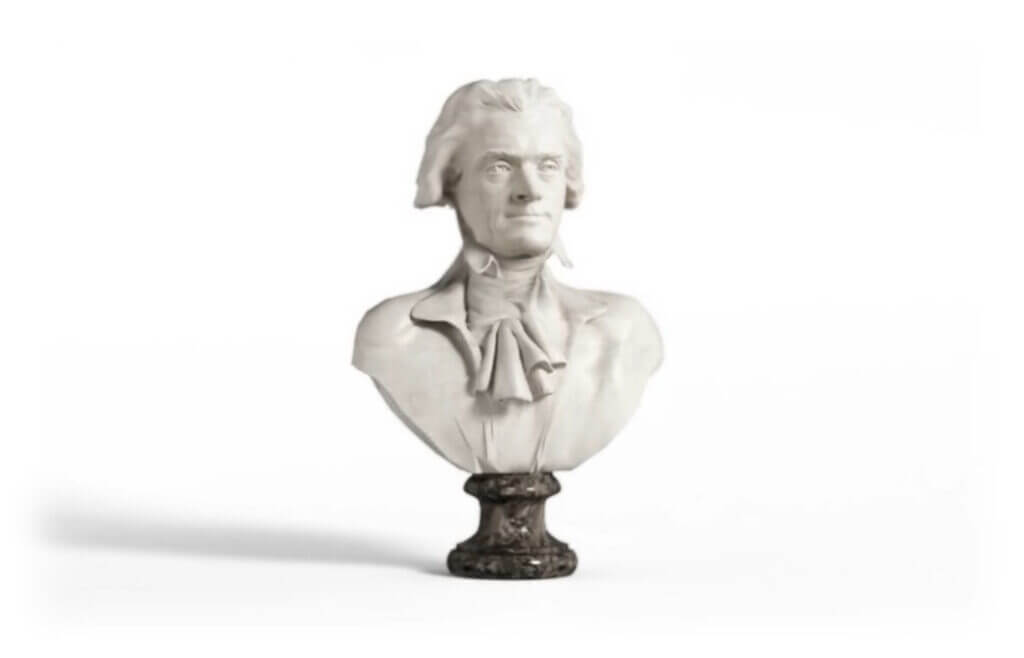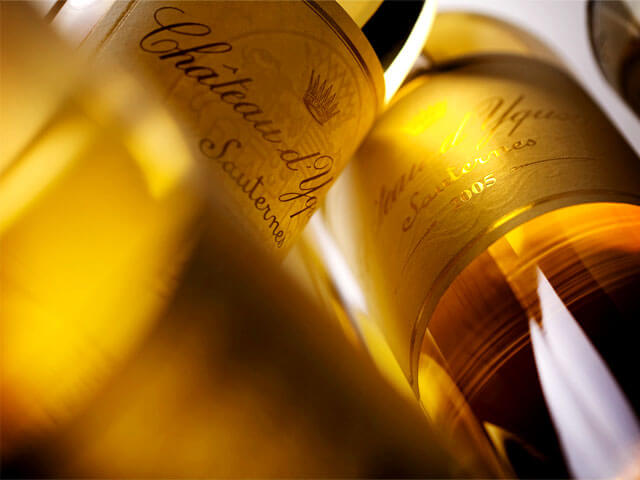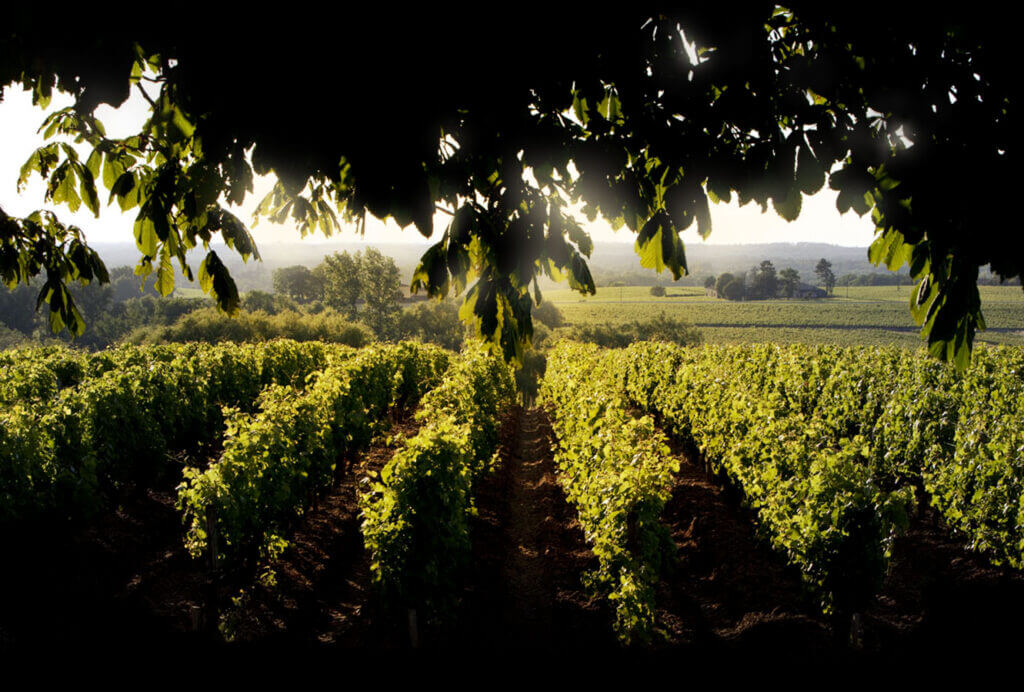Wines from Château d’Yquem, produced in Sauternes, France in the southern region of Bordeaux, are widely recognized as some of the best sweet white wines in the world.
French for “Superior First Growth,” Château d’Yquem is a Premier Cru Supérieur wine produced in the Graves region of southern Bordeaux, in the Sauternes, Gironde region.
Château d’Yquem was the only Sauternes awarded this rating in the Bordeaux Wine Official Classification of 1855, reflecting its recognised excellence and greater price over all other wines of its category. The success of Yquem is largely due to the location’s vulnerability to “noble rot” attacks (a particular kind of infestation by Botrytis cinerea).

Extraordinary Wine With Exceptional Longevity
Complexity, concentration, and sweetness are hallmarks of Château d’Yquem wines, which are offset by very high acidity. A bottle can last for up to a century with appropriate storage, and over time, the fruity overtones will gradually disappear and blend in with the more nuanced secondary and tertiary flavours.
History Spanning Over Four Centuries
Château d’Yquem’s interesting rich history reads like a novel, an epic saga full of events and colourful characters, and spans over 400 years. The estate was almost English, it actually belonged to the King of England, who was the Duke of Aquitaine at the time, during the Middle Ages. Charles VII restored the French crown’s control over southwest France in 1453, and it has been French ever since.
Jacques Sauvage, a member of a local aristocratic family, was granted feudal tenure over Yquem in 1593, an additional century and a half later. Both the château’s and the Gironde department’s archives demonstrate that unique winemaking techniques and late harvests were already in use at this time.

Construction of the Chateau Begins
A few years later, the Sauvage family began construction on the château and slowly began assembling the current vineyard, plot by plot. In 1711, under the reign of Louis XIV, the family acquired complete ownership of Yquem (by which time they had received noble status). Count Louis Amédée de Lur-Saluces and Françoise Joséphine de Sauvage d’Yquem were wed in 1785.
The count passed away in 1788 following a riding accident, three years later. Thus, his young widow took over as head of the family and managed the estate with exceptional skill.

Famous Friends and Prosperous Times
Thomas Jefferson and other well-known connoisseurs of the time were already big fans of the wine. Jefferson purchased 250 bottles of 1784 vintage wine for himself, as well as additional bottles for George Washington. However, because the technique of allowing noble rot to infect grapes had not yet been discovered, Jefferson was drinking a different and less sweet wine at the time.
Françoise Joséphine, a fierce opponent of the excesses of the French Revolution who was twice imprisoned, was able to maintain the family estate and make Yquem prosperous. Together with her steward Garos, she took the courageous step of building a new wine cellar in 1826, turning the estate into a legitimate company and establishing its international reputation. The technique of plucking in numerous passes was refined while she was in charge of Yquem.
Romain-Bertrand de Lur-Saluces, Françoise-Joséphine’s grandson, took his role as manager of Yquem very seriously, rather than simply taking possession of the family estate, which had become mythical by this point.
“An exquisite nobility that goes down inside like light. Because Yquem is also light. Light that one drinks!” - Frederic Dard
1855 Earned its Famous Classification
In 1855, the estate was designated the one and only Premier Cru Supérieur in the famous classification made at the request of Emperor Napoléon III.
Yquem experienced a long period of prosperity in the latter half of the nineteenth century. People from all over Europe went to great lengths to find the wine. Great Duke Constantine, Russia’s Tsar’s brother, made headlines when he paid 20,000 gold francs for a barrel of Château d’Yquem, an unprecedented price at the time.
Château d’Yquem and its Involvement in the War
Yquem was involved in the war in 1914. In keeping with the family tradition, the château was converted into a military hospital, and Eugène’s son, Marquis Bertrand de Lur-Saluces, became an officer in the trenches. At the end of the war, at the age of 30, he took over management of the estate and remained in that position for the next half-century.
Bertrand was a strong character and ardent supporter of the Yquem philosophy.
He was an outspoken opponent of chaptalisation and fought valiantly to protect the family estates, even during the Great Depression of the 1930s. For forty years as President of the Union des Crus Classés de la Gironde, he was instrumental in determining many legal aspects of the Sauternes appellation. He was also a strong supporter of château bottling to ensure authenticity.
Bertrand de Lur-Saluces, a Second World War enlisted officer, was captured and imprisoned for two years. He was, however, fortunate enough to be able to return to his beloved estate as soon as he was released. Until his death in 1968, he did much to develop Château d’Yquem, particularly in terms of its international impact.
The Modern Age and Continued Authenticity
Without an heir, Bertrand de Lur-Saluces, who was childless and concerned about the future of Château d’Yquem, took precautions in the event of his death. In 1966, he appointed Alexandre de Lur-Saluces, one of his brother Amédée’s sons, to manage the estate.
Initially, the young count had a difficult time as he had to deal with a string of bad vintages, a deep crisis in the Bordeaux wine trade, and an exorbitant inheritance tax that threatened d’Yquem’s survival. The estate was saved by strict management and the excellent 1975 vintage, which followed three disastrous ones. Several excellent vintages in the 1980s allowed us to get back on track and make new investments.
Over the course of fifteen years, production gradually increased, as did quality and technical expertise. Château d’Yquem, a veritable monument and one of France’s greatest wines, was acquired by LVMH Louis Vuitton-Moët Hennessy at the end of the twentieth century, thanks to the impetus of Bernard Arnault. This marked the beginning of a new era in the château’s history. Since then, he has continued to promote the estate’s authenticity, openness to modernity, and the winemaking team’s expertise.
A Look at the Wines
The Incomparable Style of Yquem
The pleasure of tasting Yquem is difficult to put into words. It has a wide range of well-balanced, complex flavours that produce even more harmonies over time. The lasting impression is reminiscent of Frédéric Dard’s quote about “the silence that follows a piece by Mozart, in which the listener remains suffused with the music”. This reflects the fact that Château d’Yquem lasts a long time on the palate, providing a unique, prolonged pleasure. The French have a lovely expression for Yquem’s extremely long aftertaste: il fait la queue du paon, which means it spreads out like a peacock’s tail.
“I do not call Yquem a wine because there are an infinite number of “wines” as such, but Yquem is unique. I prefer the word nectar – the drink of the gods – and if I found one that was more noble, I would be less ashamed of our restrictive vocabulary so poorly suited to superlatives.”
Frederic Dard
Each Bottle Tells a Story
It is always difficult to describe wine-tasting experiences with any precision. The senses of sight, smell, taste and touch are all stimulated virtually at the same time. While gifted tasters can identify some of the aromas and flavours in a glass of Yquem in an effort to define its complexity, they never really succeed in communicating its essence or explaining its mystery. Mere analysis, whether chemical or organoleptic, is not sufficient to account for Yquem’s greatness. Yquem tells a unique story.
It starts with the bouquet.

Complex and Distinctive, Silky and Sumptuous
Although it is not always very expressive in young vintages, it is distinguished by fruit (apricot, mandarin, and occasionally tropical fruit) and oak (vanilla and toasty aromas). Older vintages, on the other hand, have an extremely complex fragrance from the moment the bottle is opened, with hints of dried fruit (dried apricot, prune, stewed fruit, and marmalade), spice (cinnamon, saffron, and liquorice), and even flowers (lime blossom, etc.).
Château d’Yquem’s first impression on the palate is always silky and often sumptuous.
It then expands and “coats the palate.” This fine wine has a strong but never overpowering personality, as well as great elegance and poise. It always keeps a balance of sugar and acidity (sweetness and freshness). A hint of bitterness can also add to the overall harmony. The aftertaste of Château d’Yquem is legendary, and it tells another story that lasts and lasts.
When Should You Drink it?
According to certain connoisseurs it is considered that drinking a young Yquem as sacrilege, believing that opening such a monumental wine before its thirtieth birthday is like sacrilege. But to others, some believe that Yquem can be enjoyed at any stage of its life.The choice is up to the collector and drinker.
Some Years No Wines Are Produced
Sometimes, nature deprives them of certain vintages of Yquem. No Yquem was produced in the years 1910, 1915, 1930, 1951, 1952, 1964, 1972, 1974, 1992, and 2012.
Is this Wine a Worthy Investment?
According to Vinovest, yes it is; Chateau d’Yquem wine is among the best investments you can make. Following LVMH’s acquisition of Chateau d’Yquem in 2004, the release price of the following vintages skyrocketed to $4,800+. (more than double of previous years.) In terms of price appreciation, vintages from 1995 to 2004 increased in value by 8% on average, while newer vintages (after 2005) have remained stable. The wine frequently sets auction records for being among the highest-priced wines. A bottle of Yquem from 1811 sold for a record-breaking $117,000 in London in 2011, becoming the most expensive wine bottle ever sold. A 135-year vertical lot sold for $1.5 million at The Antique Wine Company in London five years earlier, in 2006.
Incredible Vintages: Editor Selects Chateau d’Yquem
 Château D’Yquem 2005
Château D’Yquem 2005
The 2005 growing season had everything pointing to a great vintage:
Moderate water stress, a temperate end to the summer season conducive to good acidity, alternating periods of rain and dry heat for optimum botrytisation, and so on.
The wine has a phenomenally complex bouquet, confirming the vintage’s exceptional quality.

Château D’Yquem 1995
From May to August, very warm, dry weather was followed by 110 mm of rain in 24 hours…
In September, there was enough precipitation to cause botrytis, which quickly spread.
From then on, the weather was very cooperative. When the harvest began, the grapes had 16° potential alcohol, but this rose to 30° in two weeks, by which time we had fortunately finished picking.
The patience paid off, and the grapes harvested at different stages blended beautifully to create a wine that is both unique and fantastic!

Château D’Yquem 1975
The cool spring weather brought about some coulure.
In August, there was just enough rain to prevent water stress.
The harvest was completed on the 17th of November after three passes to avoid over-concentration.
There weren’t many grapes, but they were delicious. 1975 is considered a benchmark vintage for the 1970s. It’s very well-balanced, with a lot of purity and underlying power.
 Château D’Yquem 1967
Château D’Yquem 1967
This year had a beautiful dry hot summer and a very successful first pass from 26/9 to 3/10, accompanied by a few scattered showers, characterise this vintage.
Picking resumed on September 10th. Temperatures were high, even at night, making perfect botrytis possible.
The harvest ended on October 26th.
The grapes were extremely ripe and concentrated.
The wine has a delicate balance and is considered a benchmark vintage for the 1960s and 1970s.
 Château D’Yquem 1893
Château D’Yquem 1893
This vintage represented a completely unusual year: hot and dry from April to October, and a month earlier than usual: Flowering began on the 5th of May, véraison (colour change) began on the 15th of July, and harvest began on the 28th of August.
Grapes with extremely high sugar levels were picked one by one until September 15th, when the quantity increased to the point where the cellar’s maximum daily pressing capacity (75 barrels of wine) was reached.
Sparse rains in October botrytised the remainder of the crop, and three passes yielded an enormous amount of grapes with potential alcohol levels approaching 30°!
This was an exceptional year at Yquem, with 25 hl/ha produced and grapes averaging 22°.
Visit Chateau d’Yquem Winery and Taste the Wines
Savour Château d’Yquem at the Château d’Yquem will arouse all of your senses and leave an indelible impression on your mind. A must for lovers of their fine wines, is a visit to the 400-year-old Château d’Yquem where awaits you is discovering an estate that values art and craftsmanship in order to produce a rare wine. Yquem stirs the heart, moves the soul, and awakens the senses whilst you enjoy a moment of grace., a place to visit at least once in your lifetime.
Each visit is a private one and guided by their specialists, resulting in a documented and personalised approach to your discovery of the estate. Tasting rounds out each visit, providing insight into one or more vintages (depending on the chosen formula).
For your visit, note that there is a maximum number of participants permitted: 6 (tastings not allowed for persons under the age of 18). Visitors are asked to notify them 48 hours in advance if the number of participants in the scheduled guided tour changes. Your walking tour lasts 90 minutes and is done entirely on foot. Animals are not permitted.
Choose between three tasting visits:
“Discovery”
Tasting 2017 Château d’Yquem
cost: 84 € including V.A.T per person
“Anthology”
Tasting of two anthology vintages of Château d’Yquem: 2005 and 2015
cost: 150 € including V.A.T per person
“Trilogy”
Tasting of three vintages of Château d’Yquem: 2005, 2009 and 2017
cost: 300 € including V.A.T per person
For more information on these wines, and to plan your tasting experience, visit https://yquem.fr




